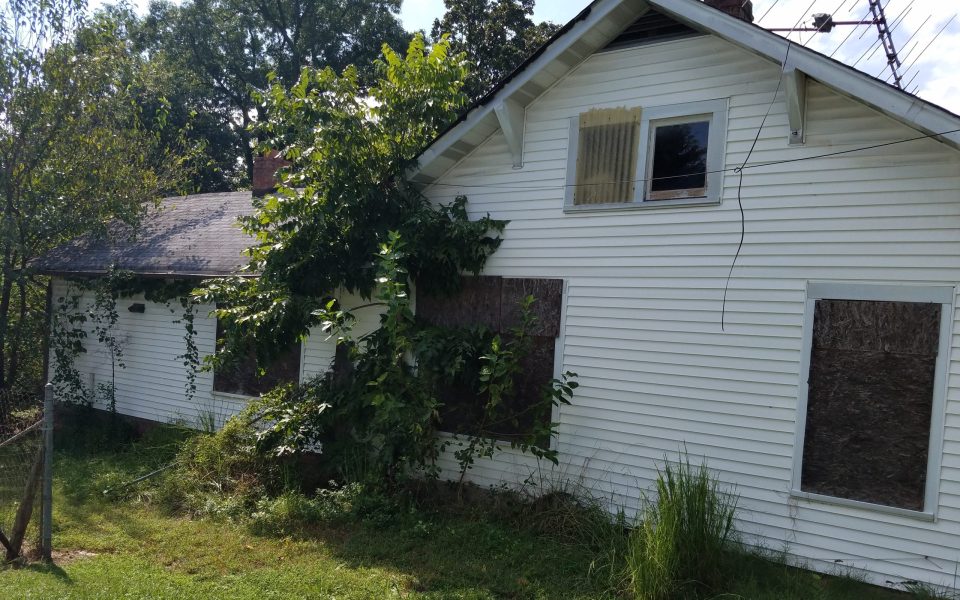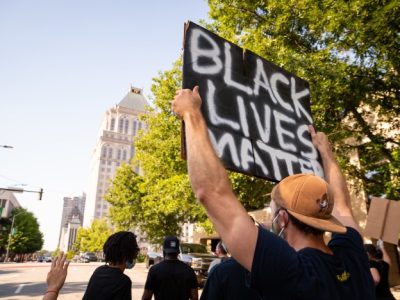“The forgotten men and women of our country will be forgotten no longer,” President Trump pledged during his inauguration speech.
Americans want “great schools for their children, safe neighborhoods for their families, and good jobs for themselves,” Trump said, adding that too many live a different reality.
The litany that followed gave first mention to “mothers and children trapped in poverty in our inner cities,” followed by a nod to his primary constituency, as he talked about “rusted-out factories scattered like tombstones across the landscape of our nation.” Put aside for a moment his contemptuous dismissal of “an education system flush with cash” — an obvious plug for charter schools — and his reference to “the crime and gangs and drugs” — given historically low crime rates, it’s a racially-coded appeal for heavy-handed law enforcement in the very same “inner cities” and other areas populated by people of color.
Considering that the plight of urban America virtually disappeared from Trump’s speeches between Election Day and his inauguration as he appointed a parade of plutocrats to his cabinet, it would be naïve to think for a second that the president has any intention of helping the urban poor.
If we take anything away from press secretary Sean Spicer’s claim against all available evidence that “this was the largest audience ever to witness an inauguration” — endorsed as “alternative facts” in senior White House aide Kellyanne Conway’s Orwellian phrasing — it’s that the administration will soon be declaring a new era of prosperity in the face of abundant evidence that conditions are in fact becoming worse for the poor.
Social critics from Masha Gessen and Ned Resnikoff to Henry A. Giroux and David A. Graham have observed that when Trump, like Vladimir Putin — the Russian leader he so admires — lies flagrantly about mundane matters that are easily refuted, he’s not doing so because he thinks he won’t get caught, but to assert his supremacy over the facts. He’s making a point that the facts don’t matter. The administration’s attack on the media, on display at both the president’s visit to the CIA and Spicer’s press briefing on Jan. 21, is a calculated effort to bewilder the public and ultimately promote a collapse of critical engagement.
That’s why it’s essential to lay down and defend a baseline of facts, against which to assess the spectacle of distraction created by the first reality-television presidency — and yes, the irony of that coinage is fully intended.
The first signal of the administration’s actual policy with regard to urban America and the poor came only an hour after the new president was inaugurated when the Department of Housing & Urban Development reversed an Obama administration rate cut for mortgage insurance for Federal Housing Administration-backed loans. Mortgage insurance is an onerous added expense for first-time homebuyers who can’t afford a significant down payment or who carry a history of poor credit, and denying them relief is likely to put them more at risk for foreclosure and prevent them from saving money for crucial home repairs and other investments that build wealth.
Notwithstanding his inspiring biography as a child who grew up in public housing in Detroit to become a renowned neurosurgeon, Trump’s nominee for secretary of housing and urban development has mostly distinguished himself as a critic of the agency he hopes to lead.
Dr. Ben Carson assailed a HUD rule requiring municipalities to “affirmatively further” racial desegregation in housing in a July 2015 op-ed article in the conservative Washington Times.
“The new rule would not only condition the grant of HUD funds to municipalities on building affordable housing as is the case today, but would require that such affordable housing be built primarily in wealthier neighborhoods with few current minority residents and that the new housing be aggressively marketed to minorities,” he wrote. “In practice, the rule would fundamentally change the nature of some communities from primarily single-family to largely apartment-based areas by encouraging municipalities to strike down housing ordinances that have no overtly (or even intended) discriminatory purpose — including race-neutral zoning restrictions on lot size and limits on multi-unit dwellings, all in the name of promoting diversity.”
Carson walked back his opposition somewhat during his Jan. 12 confirmation hearing, saying, “I don’t have any problem whatsoever with affirmative action or at least integration; I have no problem with that at all. But I do have a problem with people on high dictating it when they don’t know anything about what’s going on in the area.”
Considering his previous disdain to federal housing policies that “affirmatively further” racial desegregation in housing — a goal commonly known as “fair housing” — it’s unlikely that Carson supports more aggressive interventions such as a new rule created by the Obama administration set to take effect this month that would calibrate Section 8 subsidies to allow tenants to rent in better neighborhoods. The federal government could go even further in attacking racially concentrated areas of poverty by prohibiting landlords from refusing to accept Section 8 vouchers as a matter of enforcing the 1968 Fair Housing Act, researcher Richard Rothstein suggested in a recent interview with Triad City Beat.
The stakes are high: Last week’s cover story in TCB reported that a recent study commissioned by the city of High Point found that six Census blocks in the heart of the city struggle under the weight of poverty levels ranging from 42 percent to 87 percent. More than 80 percent of the population in the six Census blocks is non-white.
Growing up in such areas subjects children to profound hardships and dramatically stunts opportunities for social mobility.
As the report by the UNCG Center for Housing & Community Studies noted, “Many of the poorest neighborhoods have only limited access to amenities such as good schools, healthcare or affordable and nutritious foods. Access to retail shopping and high-quality childcare is also quite limited in most of these areas. Combined with the relative lack of extensive public transit systems, persons living in such areas are greatly disadvantaged.”
There are policy tools available to address the conditions in the High Point ghetto and other places like it. One is new rule created by the Obama administration that will begin this month if President Trump doesn’t rip it up first.
As Rothstein wrote in a recent blog post, “One important HUD program is the Section 8 voucher program that provides subsidies to low-income families, permitting them to rent apartments at market prices. But the subsidies are based on average rents in a metropolitan area — more than enough to get apartments in low-cost, low-income, usually segregated neighborhoods, but not enough to get apartments in integrated neighborhoods where jobs are accessible, student performance in schools is high, and healthy food is available.
“As a result, the Section 8 program reinforces racial segregation,” the post continues. “The Obama administration has adopted a new rule, scheduled to take effect [in January], adjusting voucher amounts so that they are sufficient to rent housing in better neighborhoods. Mr. Carson should enforce this rule, helping to reverse the social engineering that created distressed urban areas.”
If Carson revealed anything about how he’ll run HUD, it’s that he’ll be a hands-off secretary, largely entrusting local municipalities and housing authorities to decide how to spend federal funds, whether they reinforce longstanding patterns of inequality or not.
Maybe Carson, the critic of big government, never expected to be running it. Or maybe he was being prophetic when he concluded in the Washington Times: “There are reasonable ways to use housing policy to enhance the opportunities available to lower-income citizens, but based on the history of failed socialist experiments in this country, entrusting the government to get it right can prove downright dangerous.”
Join the First Amendment Society, a membership that goes directly to funding TCB‘s newsroom.
We believe that reporting can save the world.
The TCB First Amendment Society recognizes the vital role of a free, unfettered press with a bundling of local experiences designed to build community, and unique engagements with our newsroom that will help you understand, and shape, local journalism’s critical role in uplifting the people in our cities.
All revenue goes directly into the newsroom as reporters’ salaries and freelance commissions.





Leave a Reply